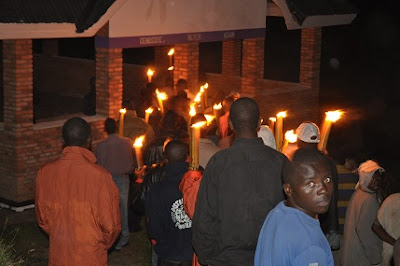 |
| The villagers sit to across from the genocide memorial. For one full week, the villagers come every day to discuss developing and healing after the genocide. |
 |
| A nightime vigil. For two nights during the Memorial Week, villagers come to listen to music, remember, light candles at the memorial, and say prayers. |
On April 7, 1994, President Habyarimana’s plane was shot down on approach to Kigali International Airport. The incident marks the beginning of the genocide, as mass killings began hours after the plane crashed. Today, the Rwandan Government recognizes April 7 as National Mourning Day.
National Mourning Day is one of the most important days for Rwandans, since there are almost no businesses open, no buses running, no celebrations. The day usually commences with a community gathering and discussion on remembering the victims of the genocide. At night, there is a vigil held in remembrance that includes music, candles lit at memorial sites, and bonfires. In a country where stores are open every day of the week and people work almost constantly, this is a rare opportunity for people to stop and think solely of the victims and events of the genocide.
National Mourning Day is the first day of a week recognizing the genocide. For this week, there are daily community discussions that are emceed by community leaders. On the last day of the week, there is another major holiday where transportation and shops are shut down.
For the entire month of April, there are generally no celebrations of any kind, as it is a time solely to remember the genocide. The genocide remembrance officially ends on July 4 (Rwandan Liberation Day) in coincidence with the day when the genocide officially ended when now-President Paul Kagame’s forces took control of Kigali.

No comments:
Post a Comment